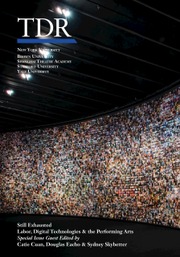Crossref Citations
This article has been cited by the following publications. This list is generated based on data provided by Crossref.
Nayar, Pramod K
2024.
14Posthumanism.
The Year's Work in Critical and Cultural Theory,
Vol. 32,
Issue. 1,
p.
234.
Hadar, Misha
and
Korte, Christine
2024.
Introduction to Special Issue on German Theatre: Diversity, Contestation, Inclusion.
Seminar,
Vol. 60,
Issue. 4,
p.
273.
Gardner, Natasza S.
2024.
Roma Armee’s Call to Arms: Fostering Non-Territorial Community through Theatre.
Seminar,
Vol. 60,
Issue. 4,
p.
286.
Koerner, Morgan
2024.
Racial literacy and performative pedagogies in the German theater practicum.
Die Unterrichtspraxis/Teaching German,
Vol. 57,
Issue. 2,
p.
145.
Imbrigotta, Kristopher
2024.
Performing solidarity and building activist communities in Simone Dede Ayivi's Solidaritätsstück.
The German Quarterly,
Vol. 97,
Issue. 3,
p.
385.


